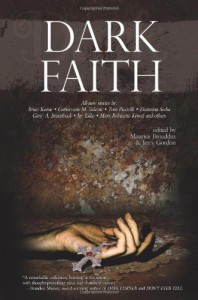
Dark Faith
 I'm a big fan of Apex Publishers, and this collection of short stories and poetry did not disappoint. I cannot recommend it highly enough to fans of horror and dark fiction.
I'm a big fan of Apex Publishers, and this collection of short stories and poetry did not disappoint. I cannot recommend it highly enough to fans of horror and dark fiction.The theme of the collection is faith of all types: having faith or losing faith or finding faith; faith in higher powers, faith in the goodness of people and faith in the ugliness of people; faith in yourself and faith in the cold, uncaring machinations of the world around you.
Like the other Apex anthologies I've read, there were a few pieces that were a little too abstract my unsophisticated brain to wrap around. "The Mad Eyes of the Heron King" by Richard Dansky, "First Communions" by Geoffrey Girard and especially "To the Jerusalem Crater" by Lavie Tidhar were too obtuse and deeply allegorical for me to connect with. I leave it to more educated and widely read readers to extract higher purposes from them. I did enjoy reading them at a purely technical level, the writing is superb even if the greater meaning eludes me.
The real standout stories will each sit with me for a long time. I especially liked "Ghosts of New York" by Jennifer Pelland, a story about acceptance, remembrance and the tragedies we relive in our heads every day. "He Who Would Not Bow" by Wrath James White has a protagonist I identify with deeply and expores the space between your own awareness and that of omniscience. The next story in the anthology also hit me deeply, "Zen and the Art of Gordon Dratch's Damnnation" by Douglas F. Warrick, another allegory on acceptance, focuses on humility and the way we create our own hells for ourselves. I related this story to my own relationship to alcohol.
"Mother Urban's Booke of Dayes" by Jay Lake covers the same territory as "He Who Would Not Bow", but from an entirely opposite angle. For the first few paragraphs, I thought it was rehashing a lot of common characters and scenes, but Jay brings them all to life and makes the story feel vivrant with a freshness and vigor I truly found inspiring. J. C. Hay's "A Loss for Words" is an excellent study of the classical Calliope tale, set in the modern world. As someone who just decided to be a writer it struck a cord and made me question my own creative process. "The Choir" by Lucien Soulban uses Cthulu-esque imagery and plot to show that the best of humanity can come through in the face of the worst horrors. The final story, and a perfect choice for ending the book, "For My Next Trick I'll Need a Volunteer" by Gary A. Braunbeck is a tale of redemption with strong overtones of "A Christmas Carol" and "It's A Wonderful Life", though it's clearly dark fiction.
There are several other stories I didn't mention, please don't thing that because I'm a lazy reviewer that they aren't worthy. There wasn't any weak piece in this book; reading it in order like I did is the heroes journey. It starts out in an unhappy place, goes through hell, fights monsters and finally comes out at the end on a positive note. As a collection of stories, it's one of the best anthologies I've ever read.



